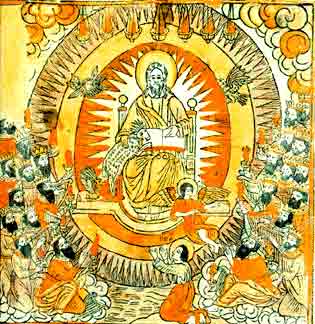Today’s hymn
from Sing Praise is “Restore, O Lord, the honour of your name” by Graham Kendrick
and Chris Rolinson. This is another of
Kendrick’s 1980s hymns that has stood the test of time, both for its memorable
tune, and because it addresses ideas that don’t lose their relevance.
When
planning the allocation of the hymns across the year I wasn’t paying attention
to the daily lectionary, but John in his video noted the link between the theme
of this hymn and the book of Ezekiel which is being read at Morning Prayer for
the next few weeks. Both are about
restoration from times of trouble. Ezekiel
spoke to the Jewish exiles who had lost their homeland and maybe were in danger
of losing their hope in God. The hymn
speaks to Christians today who have, perhaps, lost a sense of God being with us
and working through us, and we also may risk losing our hope in God himself.
The first
verse calls for God to restore his own honour, by works of power that make
everyone realise he is the one in control.
Since the hymn was written, there has of course been a great increase in
the number of people concerned for the future of human society, not least because
of the climate crisis. People of faith long
for God to step in and put things right, but we are working with others who
have no religious conviction, who can only call for everyone to do their bit “for
the sake of the planet”. The challenge for us Christian environmentalists is to
work with them on the practical actions we can take, without losing faith that
God somehow has a bigger plan that indeed “his kingdom shall outlast the years”.
The second verse
acknowledges that it is not only God’s apparent lack of action that leads to
earthly problems, but the Church’s own failings. We call on him to “revive in our time the
church that bears your name” and to have mercy on our failings. We have failed to move with the times, lost a
whole generation of adults who no longer have any connection with Christianity
(though some find spirituality in other forms), and often lost hope that they
will ever come back. It needs a movement of God’s Spirit, not just our own good
intentions, to reclaim that lost ground for Christ.
The third verse move from the corporate to the individual level. “Bend us, O Lord, when we are hard and cold, in your refiner’s fire come purify the gold” is the cry of anyone who realises they have lost their love for God and enthusiasm for worship and witness. There is perhaps a mixed metaphor in these lines, both of a hard iron rod needing to be heated in the fire to make it malleable, and of a gold alloy that can be purified by melting out the impurities. Both are meaningful images, as we need both to be purified of our sins, and heated with love for God, before we can truly hope in him. It recognises also the reality of suffering and evil, which in their many forms prevent us from fulfilling our potential as people and as God’s servants.
The last
line (unless you repeat verse 1 as suggested in the book), is also a message of
hope: “still our living God is reigning, he is reigning here”. Unbelieved by many outside the Church, unacknowledged
in practice by many within it, our hearts hardened by sin and worldly worries,
yet God is still reigning, and hears us when we call on him for restoration.
